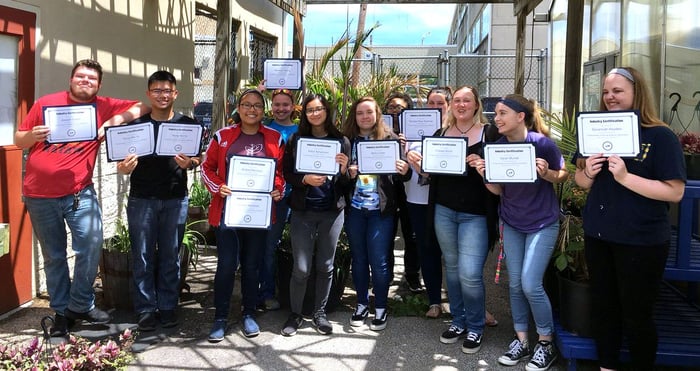CTE Curriculum
Prepare learners with CTE curriculum aligned to industry standards.
Case Study
Industry Certifications Lead to Employment Opportunities for Students
The Skills Gap
There is a need for well-trained, highly-skilled individuals to fill the growing skills gap impacting the U.S. economy. According to the National Skills Coalition, 53 percent of jobs are considered middle-skill, meaning they require education beyond a high school diploma but less than a college degree. Middle-skill positions must be filled by individuals who are knowledgeable and skilled in a particular field or subject area.
While middle-skill jobs make up more than half of the total U.S. workforce, only 43 percent of employees meet middle-skill job requirements. The disparity between available jobs and the skills needed to perform those jobs has created a skills gap that is only expected to grow. Data from the National Skills Coalition suggests that 52 percent of jobs are middle-skill positions.
Due to the demand for skilled workers, the National Bureau of Economic Research indicated employers are becoming more demanding of the skills and training applicants must demonstrate during the hiring process. However, employers are not experiencing consistent success in finding skilled applicants, but have difficulty hiring qualified applicants as a result of the growing skills gap. The Society of Human Resource Management found nearly 60 percent of employers have vacant positions for more than 12 weeks. Businesses who experienced hiring challenges reported an average of $14,000 loss per job when they were unable to find skilled employees, according to Advance CTE.
In efforts to address the growing skills gap, the education system is emphasizing the importance of Career & Technical Education (CTE) to prepare youth for high-wage, high-skill, in-demand jobs. As reported by the Association for Career & Technical Education, CTE prepares individuals for educational and career success by enhancing their technical, academic, and employability skills. As part of the developing emphasis on career preparedness, state accountability programs are requiring schools to exhibit their students’ readiness for the workforce through a variety of measures, including earning industry certifications.
Closing the Gap
Seneca High School in Louisville, Kentucky places a heavy emphasis on preparing students for college and career success. To fulfill Seneca’s mission, agricultural sciences teachers Kristan Wright and Bethany Mattingly use industry certifications to enhance students’ employability and verify their technical skills. The agricultural science program at Seneca offers three pathways: animal science, horticulture and environmental science.
As a magnet program, the agricultural science department attracts students from across Louisville. Due to Seneca’s urban setting, very few students have knowledge of or experience with agriculture. In Wright’s eight years at Seneca, only one of her students has had an agricultural background. Because their students have limited agricultural science experiences, Wright and Mattingly use innovative approaches that appeal to their students’ backgrounds and motivations. One of the ways they accomplish this is by incorporating industry certifications from various industry-leading businesses and organizations in their course designs.
iCEV, a comprehensive solution for CTE curriculum, certifications, and data management, serves as a testing platform for 19 industry certifications. Because Wright and Mattingly already used iCEV resources as supplemental materials, they decided to include the industry certifications tested for on the iCEV platform which best fit the outcomes and objectives of their classes.
In the introductory animal science course, Wright required her students to complete the Elanco Fundamentals of Animal Science Certification. While it was not a mandatory assignment, Wright encouraged the students in the veterinary medicine class to earn the Elanco Veterinary Medical Applications Certification. Mattingly required BASF Plant Science Certification in the plant science class and assigned the Benz School of Floral Design Principles of Floral Design Certification to the students in the floral design class.
Since they began incorporating industry certifications in their course designs, 125 of Wright and Mattingly’s students have earned industry certifications.
Not only did the industry certifications enhance the students’ knowledge and skills, earning a certification led to success in a variety of areas. According to Wright and Mattingly, many of their students gained employment opportunities or advanced in their positions as a result of earning an industry certification. A local landscaping company hired five Seneca High students and offered to pay them $1 more per hour because they earned the BASF Plant Science Certification.
Mattingly reported several students who received the Benz School of Floral Design Principles of Floral Design Certification made $20 an hour in local flower shops and greenhouses. One student, who completed both Elanco industry certifications, worked as an intern for the Kentucky Department of Agriculture.
Cheyenne Young is one of the outstanding examples of industry certification success from Seneca High School. During her time at Seneca, Young earned the Elanco Veterinary Medical Applications Certification. Because she wanted to gain more experience in veterinary medicine, Young applied as a veterinary assistant at the Veterinary Centers of America (VCA) Fairleigh Animal Hospital in Louisville, Kentucky. Despite the company’s policy requiring employees to be at least 18 years old, the clinic hired Young when she was just 17 because Elanco, an industry leader in animal health, validated her knowledge and skills. Her extensive knowledge of and proficiency in veterinary principles and procedures was evident, and Young’s starting salary was equivalent to the average salary of a veterinary assistant with five years of experience. After graduating from Seneca High School, Young went on to study animal science at the University of Kentucky.
The Certification Payoff
Research has shown industry certifications are effective tools for achieving career success. A multi-year, multi-state data collection project from ACTE reported that individuals with industry certifications were more likely to be employed one year after earning an industry certification. Certification earners were also more likely to earn higher wages than non-certified individuals, with some cases reporting wage increases of as much as 42 percent.
Industry certifications validate an individual’s knowledge and skills and offer a variety of benefits to employers and employees. When an applicant lists an industry certification on his or her resume, a reputable industry leader assures an employer that the individual is well-trained and highly capable. Due to the employee’s depth of knowledge and skills in their particular field, the employee will require less onboarding and training time, reducing the need for extensive financial or human resources to be dedicated to the new hire process.
According to the Association for Talent Development (ADT), it costs an average of $1,252 to train a new employee. Combined with the financial investment, employers invest an average of 33.5 hours in employee training. Research also shows that the less prepared an individual is for the position’s job requirements, the more likely they are to leave the company. The Society of Human Resource Management indicated nearly 40 percent of employees who leave their positions do so within the first 12 months of employment. A study from the Center for American Progress reported that, on average, a company will spend 21 percent of an employee’s salary to find a replacement. As indicated by these statistics, if an individual is well-trained and prepared for their field of interest, they are more likely to secure employment and be successful in that position, saving them and their employer time and money.
By incorporating industry certifications in their courses, Wright and Mattingly started their students on the path to achieving educational and career success. The Seneca industry certification earners were able to gain employment and earn higher wages because the industry certifications verified they were well-trained, knowledgeable, and qualified applicants. The students’ knowledge and skills allowed them to demonstrate their capabilities to prospective employers, ensuring the employer was making a smart hiring decision. The experiences of the Seneca students validate the need for educators to include industry certifications in CTE courses to ensure a population of well-trained, highly-qualified, career-ready individuals.
All photos courtesy of Kristan Wright and Bethany Mattingly.
SENECA HIGH SCHOOL
LOUISVILLE, KENTUCKY
About iCEV
Since 1984, iCEV has specialized in providing quality CTE curriculum and educational resources. iCEV is the most comprehensive online resource for CTE educators and students, offering curriculum for several major subject areas, including agricultural science, trade & industrial education, business & marketing, career exploration, family & consumer science, trade & health science, law enforcement and STEM education. iCEV also acts as a certification testing platform for industry certifications. Recognized companies and organizations utilize iCEV as the testing platform for their certifications. Additionally, iCEV offers Eduthings, a CTE data management platform that simplifies reporting for industry certifications, work-based learning, CTSO participation, and more. For more information, visit www.icevonline.com.




